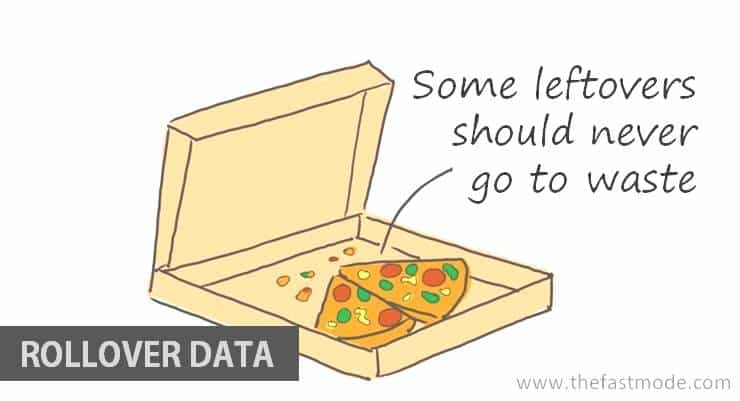Rigid plans no more. Stiffer competition and market saturation are probably giving Mobile Operators little choice but to allow their subscribers to save up unused data, instead of the usual arrangement that forfeits any unused data at the end of the billing cycle. Based on findings from Nielson, a leading research company, as shared by C-Spire, the United States' sixth largest Mobile Operator, mobile consumers use on average about 800 MB of data a month, but are paying for plans with 5 to 10 times as much data. Attributable partly to fears of overages and to the widespread availability of WiFi that makes offloading much easier, the trend towards fat balances that go to waste at the end of each billing cycle have necessitated the rolling data feature, especially across larger data plans where being able to keep the allocated quota over a longer tenure comes as a great incentive for subscribers to sign up on these plans.
This week, Optus, the second largest Operator in Australia jumped onto the data rollover bandwagon and announced the feature for its prepaid plan - My Prepaid Monthly Plus, allowing subscribers to save up to 10GB of data from expiring. The plan which includes data and unlimited calls and texting, however, allows subscribers to keep unused balances only if they recharge their plans before credit expiry, ensuring that subscribers recharge more consistently and do so prior to expiry especially when they are presented with an opportunity to do so, for example, when they come across recharging spots such as Operator stores and top-up kiosks.
The rollover data received a lot of coverage towards the end of last year when all major Mobile Operators in the US introduced the feature across their mobile data plans. The move started with C-Spire's data rolling plans launched in early December 2014 allowing subscribers to roll over their unused 4G LTE data quota to the next month. This was followed by T-Mobile's data stash offer later in that month giving qualifying subscribers free 10GB of LTE data to activate a 'data stash' which then allows users to top up the amount with unused data they wish to rollover from their accounts. When subscribers run out of data, they can withdraw from their stash, at any time up to one year. Following C-Spire's and T-Mobile's move, AT&T announced a similar plan earlier this year that allowed qualifying subscribers on their Mobile Share Value plan to roll over their data and share that rolled over data between accounts within the shared plan.
After AT&T, Sprint kicked off its own version of rollover data tailored specifically for subscribers switching over from rival networks. This was finally followed by the United States' largest Operator, Verizon Wireless who despite refusing to join the data rollover frenzy, announced during that same time that its bigger data buckets will now have an extended expiry of three months, which means that the data is effectively 'rolled over' from the current month to the following two months.
Very recently, Sprint announced an extension to their data rollover plan by extending the program to its prepaid customers and allowing them to keep up to 30GB of data with no expiration date. The offer was made available for its Prepaid unlimited talk and text plans customers and on all Sprint Prepaid monthly plans with data starting at $35 a month. Other Operators such as AT&T have since included more plans in the data rollover program.
While the idea of data rollover sounds relatively simple, a few critical network components come into play to ensure smooth delivery of this increasingly popular feature. Foremost in powering data rollover for Mobile Operators is the Policy and Charging Control function that allows usage balances, based on information captured by the system within the Subscriber Data Management (SDM), to be rolled over based on pre-configured settings where each balance is assigned a new expiry date (in the case of T-Mobile, the rollover data expires in 12 months while AT&T's rollover data which can only be rolled over once effectively expires in one month) within which the subscriber can continue using the data balance.
In the case of Optus, rolling data also features a rollover cap which allows only a certain cumulative amount of data to be kept in the 'data savings' account, in this case 10GB of data as opposed to Sprint's latest offer which allows up to 30GB of data to be saved at any one time. In addition to these parameters, rollover data also involves usage rules, as in the case of AT&T's data rollover plan where the saved data can only be used if the current period's data is exhausted. With the many flavors of rollover data found in the market today, it can be said that many of the parameters for rollover data programs are tied closely to the plans' characteristics and the feasibility of adding these parameters to a plan, and more importantly, the Operators' business objectives in terms of revenue, customer retention and expansion of market share.
Price and profit pressures aside, rollover data becomes much more relevant today when data is used not just for browsing the Internet or checking emails, which in the past, saw a relatively consistent and predictable usage pattern among subscribers. Today, the use of mobile data for rich content including viewing of longer form videos and mobile gaming has resulted in data usage that varies widely between one period to another. For example, a particular piece of popular content that becomes available on services such as mobile OTT Video-on-Demand may see data usage spiking during one period and returning to a relatively low level afterwards.
Tim Cowan, Director of Mobile Marketing, Optus, in the release of Optus' new data rolling feature said, “Prepaid customers’ data usage varies month to month – they might consume a whole lot streaming sporting events one month and far less on holidays during another month. We asked prepaid customers across the country and 82% told us they don’t use all their data every month. Customers hate losing their data and that’s why Optus is launching data rollover, so customers can have what they paid for and use that data whenever they want.” According to Vicki Brady, Managing Director of Marketing and Product at Optus, "Every household is different, but customers tell us they want plans that give them the freedom to use their data around the clock and without speed limits. With video-on-demand and streaming services becoming mainstream, we know that unlimited data is fast becoming a must have for many Aussie families".
Data savings, just like frequent flyer miles provided by airline companies or bonus points awarded by retailers, allow users to have access to additional data treats from time to time, making the scheme a great loyalty booster and a splendid way to retain customers over a longer tenure. Users with a lot of data stashed will remain with the Operator to benefit from the free data they have accumulated over time. The advent of the digital era, and shifts in pattern of content consumption, including the rise in multiscreen services and on-demand content and the increasing savviness among mobile users will hence see data rollover becoming a more prevalent feature across mobile data packages in months to come.




















